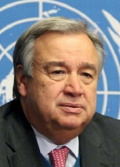|
U.N. Chief Sets Tone for Climate Conference with Dire Warning
December 2, 2019
The COP25 environmental awareness conference has begun in Madrid, with the Secretary-General of the United Nations once again issuing a dire warning for the leading nations of the world to get with the program. Antonio Guterres, the top U.N. official, had this to say, among other things, in the address that began the 11-day conference: "By the end of the coming decade we will be on one of two paths, one of which is sleepwalking past the point of no return." Guterres has been particularly critical of the G20 and other leading nations in recent days and weeks, charging them with ignoring their responsibilities to adhere the international agreement to which they agreed four years ago. He said that the youth of the world, organizing ClimateStrike events in nearly every continent for many months, were showing more leadership than their adult counterparts. It was in 2015 that leaders of nearly 200 countries signed on to the Paris Agreement, committing to a path of change in behavior with regarding to carbon emissions. The original target of keeping emissions to only a 2-degree Fahrenheit rise above preindustrial levels at the very least and, preferably, a rise of only 1.5 degrees. Now, Guterres, the situation is even more problematic because in only 10 years, the required global reduction in emissions has gone from 3.3 percent to 7. What has been problematic since the adoption of the Paris Agreement has been the extent to which the various nations of the world have agreed to halt emission activities. The 194 countries that agreed to the United Nations Framework Convention on Climate Change are meant to have crafted nationally determined contributions (NDCs) in the form of emissions reduction targets. Targets are supposed to be regular and incrementally more. However, in order to get the leading nations to sign on to the Agreement, U.N. officials had to agree to allow the meeting of those targets to be voluntary. So a nation can promise to do something but not deliver, and no punishment will be forthcoming. In reality, some nations of the world have not even announced emissions reduction targets; with no means to penalize such behavior, the U.N. is dependent on the political goodwill of the world's leaders. Attendees at last year's COP24 climate conference in Katowice, Poland, adopted a "rulebook" for making such changes. The book had 156 pages of strategies for countries to follow, divided into themes, such as mechanisms for monitoring emissions and for dealing with countries that exceeded targets. What wasn't in the rulebook was any sort of hard consequence for not cutting emission targets by 2020, when the Paris Agreement takes effect. Guterres spoke at the IFEMA exhibition and trade fair center in Madrid. Presiding at the beginning was Chile's Environment Minister Carolina Schmidt Zaldivar. Chile was supposed to be the host nation for the climate summit but appealed a few weeks ago for the U.N. to move the summit to another country because of considerable civil unrest in the South American country. Also attending the handover ceremony were officials from Katowice. Several dozen world leaders are attending the conference, which runs through December. House Speaker Nancy Pelosi is heading up the U.S. delegation. Overall, more than 25,000 delegates are on hand. Due to arrive later this week is famed teen Swedish climate activist Greta Thunberg, who had sailed across the Atlantic in order to attend the Chile conference and is now sailing back across the Atlantic. She is due to attend a large climate change demonstration in Madrid on Friday. |
Social Studies for Kids |
Social Studies for Kids
copyright 2002–2024
David White






